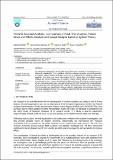DSpace Repository
Tenerife Accident Analysis: a comparison of Fault Tree Analysis, Failure Mode and Effects Analysis and Causal Analysis based on System Theory
- DSpace Home
- →
- Web Of Science
- →
- Web Of Science
- →
- View Item
JavaScript is disabled for your browser. Some features of this site may not work without it.
| dc.contributor.author | Öztürk, Fatih
|
|
| dc.date.accessioned | 2024-04-18T10:54:56Z | |
| dc.date.available | 2024-04-18T10:54:56Z | |
| dc.date.issued | 2023 | |
| dc.identifier.issn | 2147-1762 | |
| dc.identifier.uri | http://hdl.handle.net/11547/11541 | |
| dc.description.abstract | Air transport is considered to be the safest means of transport. However, if an accident occurs, it often ends in catastrophe. Thus, significant efforts have been paid to sustain successful operations in aviation. Several studies have been carried out to understand the underlying reasons for accidents. This study used Fault Tree Analysis (FTA), Failure Mode and Effects Analysis (FMEA) and Causal Analysis based on Systems Theory (CAST) methods to analyse Tenerife aircraft accident and to compare the findings of different methods. The findings showed that while all three methods provided some overlapping findings, the CAST method led to the identification of all causes that were identified by other methods. Considering the nature of the causal factors, FMEA provided more causal factors that are related to organisation and technology than FTA. This study indicates that CAST has a significant value to identify all causes that can be identified by the use of traditional methods. | tr_TR |
| dc.language.iso | en | tr_TR |
| dc.relation.ispartofseries | 36;2 | |
| dc.subject | RESONANCE ANALYSIS METHOD | tr_TR |
| dc.subject | RISK-MANAGEMENT | tr_TR |
| dc.title | Tenerife Accident Analysis: a comparison of Fault Tree Analysis, Failure Mode and Effects Analysis and Causal Analysis based on System Theory | tr_TR |
| dc.type | Article | tr_TR |
Files in this item
This item appears in the following Collection(s)
-
Web Of Science [994]


